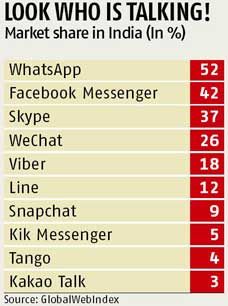The government doesn’t seem to like it but Indians are loving it.
 Last June, the government discussed a possible ban on WeChat, a Chinese instant messaging application.
Last June, the government discussed a possible ban on WeChat, a Chinese instant messaging application.
Since January 2013 tilldate, WeChat’s user base has jumped a massive 2,364 per cent in India, taking it to fourth position, reveals a study by GlobalWebIndex.
Globally, its user base rose only 156 per cent in this period.
Its application was developed and is owned by Tencent, a Chinese company.
Hence, the government says it has concerns on security.
WeChat apart, India is the hottest land of opportunity for almost all instant chat apps.
According to the GlobalWebIndex report, conducted across 32 markets involving 170,000 internet users, instant messaging as a segment has grown 113 per cent in terms of users of mobile messaging tolls since 2013.
The study shows 52 per cent of Indian instant messaging users are on WhatsApp, while 42 per cent use Facebook Messenger. Skype is used by 37 per cent.
 WeChat has a 26 per cent share in the market, followed by Viber (18 per cent), Line (12 per cent), Snapchat (nine per cent), Kik Messenger (five per cent), Tango (four per cent) and Kakao Talk (three per cent).
WeChat has a 26 per cent share in the market, followed by Viber (18 per cent), Line (12 per cent), Snapchat (nine per cent), Kik Messenger (five per cent), Tango (four per cent) and Kakao Talk (three per cent).
WhatsApp, the most used instant messaging app, used by about 70 million Indians actively, has increased its user base by 334 per cent since January 2013.
Facebook’s own messenger followed with a 192 per cent rise in active usage. Skype manage about 190 per cent more users.
Many more have also made their niches, such as Viber, Nimbuzz, Line, home-grown Hike and late entrant Telegram.
Younger people, between 16 and 34 years of age, have preferred WeChat over WhatsApp and Facebook Messenger.
While, people over 35 are more inclined to WhatsApp and Facebook, the study shows.
In the 16-24 years age group, 49 per cent use WeChat; it is 36 per cent in the 25-34 years group.
As mentioned earlier, there has been a 113 per cent rise in India in the number of people utilising mobile messaging tools since 2013.
According to GWI’s study, smartphones are vital for internet users in India, where 79 per cent of the online population own one.
Further, users of mobile messengers are young, affluent and highly active online.
The study says WeChat has the highest number of users in the Asia-Pacific, with a 38 per cent share at 337 million users.
With 140 million, Facebook Messenger takes second spot with a 16 per cent share, followed by Skype (132 million, 15 per cent share) and WhatsApp with 112 million users (13 per cent share).
The study has also noted that teens were increasingly spending less time on Facebook and preferring instant messaging apps more -- many believe the social network is not as 'cool' as it used to be.
Half the study participants said they were using Facebook less frequently than in the past.
Facebook has more users, says the study, but activity such as photo sharing and messaging has fallen 20 per cent in the past two years. This could mean instant messaging apps would eat into Facebook’s business.









 © 2025
© 2025